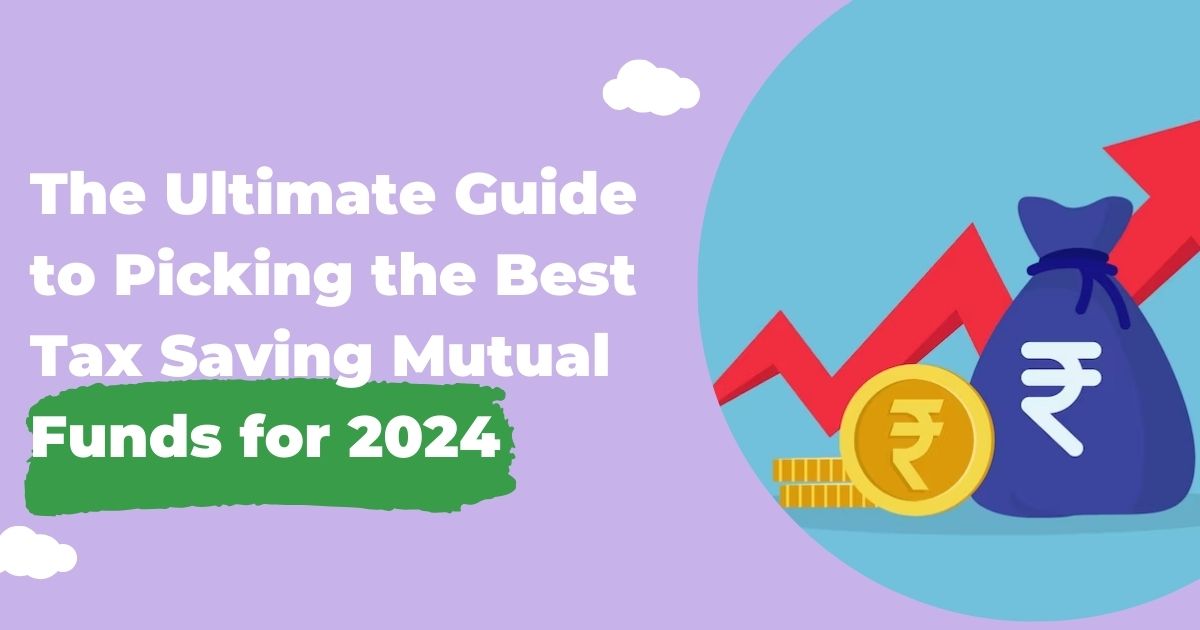The Ultimate Guide to Picking the Best Tax Saving Mutual Funds for 2024

The most popular option for tax-saving mutual funds is ELSS or Equity Linked Savings Scheme (ELSS) funds.
However, not all ELSS funds are created equal. There are over 30 ELSS funds available in the market, each with different investment strategies, risk profiles, and performance records. How do you pick the best ones for your portfolio?
Don’t get bogged down when we’ve created the ultimate guide for you. Here, we’ve covered everything from the different types of tax-saving funds to how to make your own decision.
We also covered the top three picks in the tax-saving mutual fund category.
Understanding Tax Saving Mutual Funds
Tax-saving mutual funds invest at least 80% of their portfolio in equity and equity-related securities and offer tax benefits under Section 80C of the Income Tax Act.
You can claim a deduction of up to Rs 1.5 lakh per year by investing in these funds, and save up to Rs 46,800 in taxes. But that’s not all.
However, tax saving is not the only benefit of investing in ELSS funds. These funds also have the potential for capital appreciation because they can generate higher returns than other traditional tax-saving instruments, over time.
Moreover, ELSS funds have the shortest lock-in period of just three years among all the 80C options, which gives you more flexibility and liquidity.
Types of Tax Saving Mutual Funds
Let’s explore the various types of tax-saving mutual funds and see which one might suit your financial goals.
- Equity Linked Saving Schemes (ELSS)
- ELSS invest at least 80% of their portfolio in equity and equity-related securities.
- Offer the dual advantage of tax saving and potential capital appreciation
Pro-Tip: Invest in ELSS funds only if you have a high-risk appetite and a long-term investment horizon.
- Debt-Oriented Tax Saving Funds
- Invest in debt instruments like government securities and corporate bonds.
- Offer a lower risk and a steady income, as they pay regular interest and have a fixed maturity.
- Offer tax benefits under Section 80C, but the deduction is limited to the principal amount invested, not the interest earned.
- Longer lock-in period of five years, which means you cannot withdraw your money before that.
Pro-Tip: Invest in debt tax-saving funds only if you have a low-risk appetite and a medium-term investment horizon.
- Hybrid Tax Saving Funds
- Hybrid tax benefit from both equity growth and debt stability.
- Offer tax benefits under Section 80C, but the deduction is limited to the equity portion of the portfolio, not the debt portion.
- Lock-in period of three years, which means you cannot redeem your units before that.
Pro-Tip: Invest in hybrid tax saving funds only if you have a medium risk appetite and a medium-term investment horizon.
Why Tax Saving Matters?
– Helps to diversify your portfolio
– Optimize your asset allocation
– Reduce your tax liability
– Compound your wealth
Top Picks for 2024
Here are our top three picks for 2024:
1. Parag Parikh Tax Saver Fund
| Date of Incorpation | 10 October 2012 | ||||||
| AUM (in Crores) | Rs. 58,554 Crores | ||||||
| Investing Approach | Value Oriented and Multi-cap approach | ||||||
| Fund Returns |
|
||||||
| Expense Ratio | 0.73% |
2. Mirae Asset ELSS Tax Saver Fund
| Date of Incorpation | 10 October 2012 | ||||||
| AUM (in Crores) | Rs. 58,554 Crores | ||||||
| Investing Approach | growth-oriented and large-cap biased approach | ||||||
| Fund Returns |
|
||||||
| Expense Ratio | 0.73% |
3. Quant ELSS Tax Saver Fund
| Date of Incorpation | 15 April, 1996 | ||||||
| AUM (in Crores) | Rs. 47,813 Crores | ||||||
| Investing Approach | Growth Oriented | ||||||
| Fund Returns |
|
||||||
| Expense Ratio | 0.76% |
Tips for Investing in 2024
- Understand the risks you are taking and match your risk with your return expectations.
- Set a reasonable timeline for your investment strategy. Different investments have varying time horizons and performance patterns, so plan accordingly.
- Challenge your thinking and ensure that you are not chasing performance. This can lead to poor returns and increased costs.
- If you have a long-term strategy, don’t fret day-to-day.
- Consider the impact of interest rates and inflation on your portfolio.
Conclusion
Tax saving is an important aspect of financial planning because it allows you to reduce your taxable income while increasing your disposable income. Investing in tax-saving mutual funds can also help you build wealth over time because they have the potential for capital appreciation.
Choose the right type of tax saving mutual fund that matches your risk profile and investment objective and enjoy good returns.







